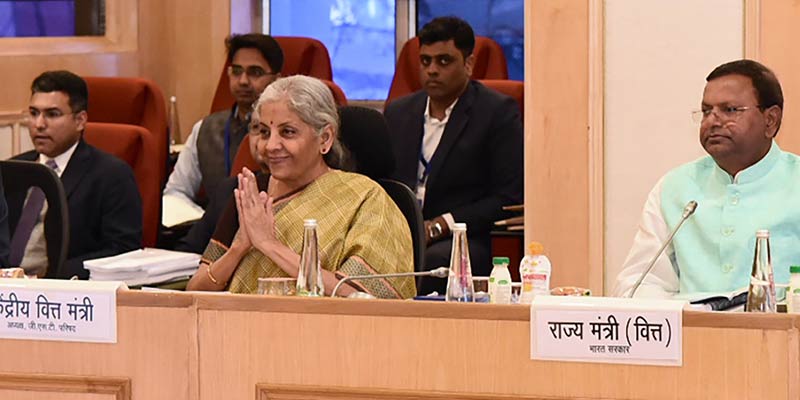- India
- Feb 20
GST Council agrees to set up appellate tribunal
• Union Finance Minister Nirmala Sitharaman said the GST Council adopted the report of the Group of Ministers on GST Appellate Tribunal with certain modifications, and the final draft amendments will be circulated to state finance ministers for their comments.
• Sitharaman chaired the 49th meeting of the GST Council on February 18.
• The GoM on Goods and Services Tax Appellate Tribunals (GSTATs) was set up in July 2022 under the chairmanship of Haryana deputy chief minister Dushyant Chautala.
• The panel has suggested that the tribunals should consist of two judicial members, and one technical member each from the Centre and states, besides a retired Supreme Court judge as president.
• The GoM report on the establishment of the GST Appellate Tribunal has been accepted with slight modifications in the language that will be shared with states and following which a final draft of the Tribunal's setting up will be worked out.
• Sitharaman also announced that the central government has decided to clear the entire pending balance GST compensation of Rs 16,982 crore for June 2022. The Centre has decided to release the amount from its own resources and the same will be recouped from the future compensation cess collection.
• With this release, the Centre would clear the entire provisionally admissible compensation dues for five years as envisaged in the GST (Compensation to States) Act 2017. The Centre will also clear the admissible final GST Compensation to those states who have provided revenue figures certified by the Accountant General which amounts to Rs 16,524 crore.
GST Council
• The introduction of the Goods and Services Tax (GST) regime in the country in 2017 was a very significant step in the field of indirect tax reforms in India. By amalgamating a large number of central and state taxes into a single tax, the aim was to mitigate cascading or double taxation in a major way and pave the way for a common national market.
• Goods and Services Tax Council is a constitutional body for making recommendations to the Union and state governments on issues related to GST.
• The GST Council is chaired by the Union finance minister.
• As per Article 279A of the amended Constitution, the GST Council, which will be a joint forum of the Centre and the states, shall consist of the following members:
a) The Union finance minister (chairperson).
b) The Union minister of state in charge of revenue or finance.
c) The minister in charge of finance or taxation or any other minister nominated by each state government.
Every decision of the GST Council shall be taken at a meeting, by a majority of not less than three-fourths of the weighted votes of the members present and voting, in accordance with the following principles:
i) The vote of the central government shall have a weightage of one-third of the total votes cast, and
ii) The votes of all the state governments taken together shall have a weightage of two-thirds of the total votes cast.
The Council is empowered to make recommendations to the Union and the States on:
1) The taxes, cesses and surcharges levied by the Union, the states and the local bodies which may be subsumed in the goods and services tax.
2) The goods and services that may be subjected to, or exempted from the goods and services tax.
3) Model Goods and Services Tax Laws, principles of levy, apportionment of Integrated Goods and Services Tax and the principles that govern the place of supply.
4) The threshold limit of turnover below which goods and services may be exempted from goods and services tax.
5) The rates including floor rates with bands of goods and services tax.
6) Any special rate or rates for a specified period, to raise additional resources during any natural calamity or disaster.
7) Special provision with respect to the states of Arunachal Pradesh, Assam, Jammu & Kashmir, Manipur, Meghalaya, Mizoram, Nagaland, Sikkim, Tripura, Himachal Pradesh and Uttarakhand.
8) The date on which GST shall be levied on petroleum crude, high speed diesel, motor spirit (petrol), natural gas and aviation turbine fuel.
9) Any other matter relating to the goods and services tax, as the Council may decide.
The mechanism of GST Council would ensure harmonisation on different aspects of GST between the Centre and the states as well as amongst the states.
Manorama Yearbook app is now available on Google Play Store and iOS App Store


